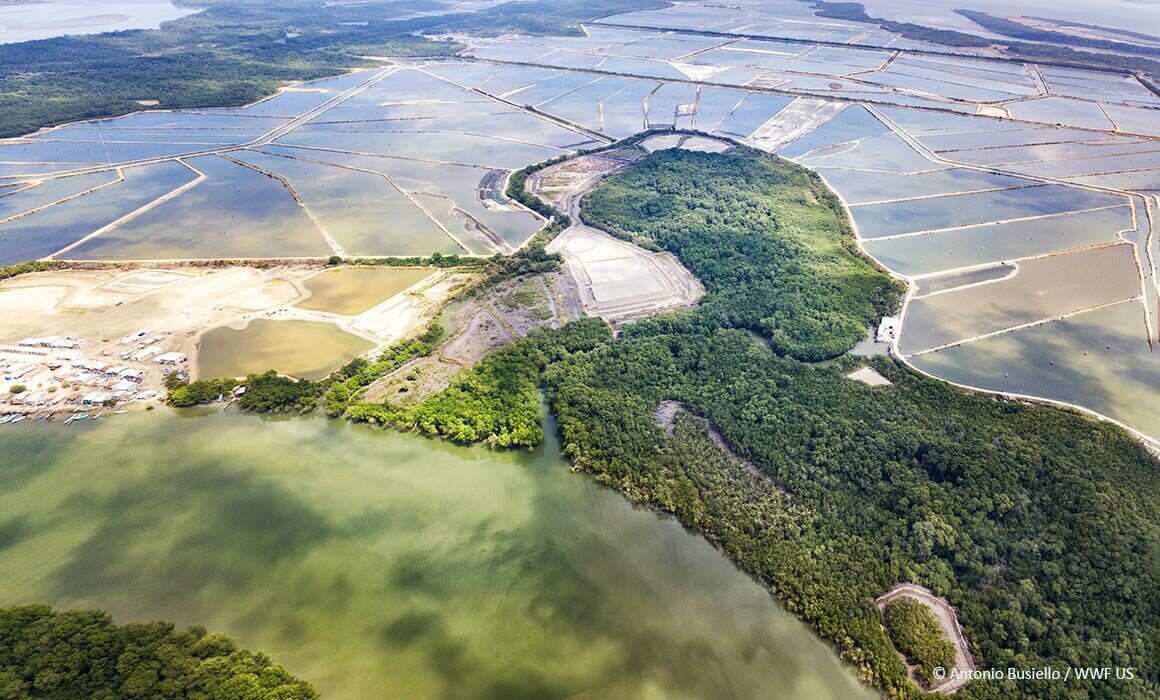Seafood buyers are increasingly looking for ways to understand and reduce the environmental risks in their supply chains, notably in shrimp aquaculture. A new Coastal Habitat Mapping Tool by Clark Labs provides insights regarding habitat conversion which might answer that. Combining high quality satellite imagery and expert geospatial analysis, Clark Labs’ aquaculture mapping tool offers a look at historical landscape changes for critical wetlands habitats, including mangroves, and aquaculture pond cover in major shrimp exporting countries around the world.
Shrimp is the most widely consumed seafood in the U.S. Yet for American consumers, responsibly produced shrimp is difficult to find.
That’s why news from India is noteworthy: One of India’s largest producers of farmed shrimp and a top exporter to the U.S., Falcon Marine has announced that, by 2020, all of its shrimp will be certified by the Aquaculture Stewardship Council (ASC). India accounted for about 32% of America’s farmed shrimp imports in 2017, making it the number one source of farmed shrimp in the U.S.
Shrimp dominates aquaculture, both in terms of volume and risk. Farming shrimp around the world provides nutrition and livelihoods for millions of people, yet it’s also associated with environmental and social harm, from water pollution to forced labor.
Shrimp aquaculture leaders in Ecuador have taken an important step forward, however, with the creation of the Sustainable Shrimp Partnership. Together, they have committed to achieving and promoting more sustainable and responsible shrimp farming.
WWF is working with some of the world’s most innovative farmers to improve shrimp production.
Shrimp has quickly become the most popular seafood in the US. Each of us eats about four pounds of it every year on average, but have you ever wondered where all that shrimp comes from?
RECENT NEWS
- Investors Prioritize Traceable Seafood as a Way to Combat IUU and Overfishing
- A New Approach for Holistic Fisheries and Aquaculture Improvement
- Kroger: A Sustainability Policy Fit for Business & Planet
- Accelerating Responsible Aquaculture Practices: ASC Launches the Improver Programme
- The road to more sustainable tuna: is scaling within reach?
CATEGORIES

ARCHIVES
- February 2024
- January 2024
- December 2023
- November 2023
- July 2023
- June 2023
- May 2023
- March 2023
- February 2023
- January 2023
- December 2022
- November 2022
- October 2022
- September 2022
- July 2022
- June 2022
- May 2022
- April 2022
- March 2022
- February 2022
- January 2022
- December 2021
- November 2021
- October 2021
- September 2021
- August 2021
- July 2021
- June 2021
- May 2021
- April 2021
- March 2021
- February 2021
- January 2021
- October 2020
- September 2020
- August 2020
- July 2020
- June 2020
- May 2020
- March 2020
- February 2020
- January 2020
- December 2019
- November 2019
- October 2019
- September 2019
- August 2019
- July 2019
- May 2019
- April 2019
- March 2019
- February 2019
- December 2018
- October 2018
- September 2018
- August 2018
- July 2018
- June 2018
- May 2018
- April 2018
- March 2018
- June 2017
- March 2017
- December 2016
- October 2016
- July 2016
- March 2016
- June 2015
- October 2014






